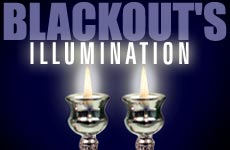 An Open Letter to University Presidents
An Open Letter to University Presidents


5 min read
The Jewish Sabbath is a blackout of sorts.
Even before my office computer went momentarily berserk and then shut down, before the lights flickered and perished and a moment of eerie quiet yielded to tentative inquiries from nearby offices, I was already thinking about candles.
Not that a blackout -- certainly not one like last Thursday's, zapping a good chunk of the continent -- was anywhere in my mental periphery. No, I think about candles every Thursday afternoon.
That's because Thursday night is when I begin to prepare in earnest for the Jewish Sabbath. Although Shabbat doesn't arrive until about an hour before sunset Friday evening, and although the bulk of preparation for the day of rest is my wife's honor (good thing, too; she's a much more accomplished chef), there are a few things that I have the privilege to do myself. One of them is preparing the candles -- or, more precisely, oil lamps and wicks -- that my wife lights before Shabbat arrives. Thursday night is when I generally provide that service, rolling the wicks -- one for each member of our family -- and pouring the olive oil into the glass lamps.
So, when I finally arrived home that Thursday evening, sopping with sweat after a miserably memorable commute (although to a wonderfully memorable welcome: the cheers of my wife and children on the deck where they stood waiting), I knew I didn't have to worry about illumination should the blackout last into the night, which of course it did. We have an ample stockpile of oil, wicks and candles (which we also use occasionally for the Sabbath) in our home. That night, there would be light.
The Jewish Sabbath itself, in fact, is a blackout of sorts. For approximately 26 hours from its beginning until Saturday night's darkness has decisively fallen, Sabbath-observant Jews forego a number of things. We don't turn lights or appliances on or off, or drive our cars. In the absence of a special enclosure-structure, we don't even carry things outside of buildings. We don't cook and don't use the phone. No lawn mowing and no workouts. Many of us shun televisions the entire week for other reasons but on the Sabbath, there's no cranking up the sound system either.
All of which, however, leaves a surprisingly full day. It's the Sabbath, after all, so there's a good amount of time in the synagogue, where prayers are said, a portion of the Torah is chanted and sermons are delivered. But Shabbat is most alive in the home, where long and festive (pre-cooked) meals are enjoyed, punctuated by song and conversation and discussion of the weekly Torah portion. Sleeping and study are mainstays of the day as well, and observant Jewish neighborhoods are cloaked on Saturdays with a spirit of calm, and peppered with neatly dressed couples, often pushing baby carriages, or groups of friends, walking to and from synagogue, to a religious lecture or study group, or just taking leisurely strolls. It is time of introspection, spiritual renewal and focus on the important things that so easily get lost in the din of workaday existence.
The myriad religious restrictions of the day need not yield great inconvenience. The judicious use of slow cookers and electric timers permits us (at least when the electrons are flowing) to enjoy hot food and bright lights. All the same, though, there are certainly challenging aspects to strict Sabbath observance. This past Saturday I was targeted by a ravenous mosquito and, killing animals or insects being among the day's prohibitions, I was barred by Sabbath law from taking revenge on the bug, though she was readily vulnerable, languidly gestating on the wall, digesting my blood.
Both situations create an awareness that we are not in charge, that there is something bigger out there to which we are beholden.
And yet there's something paradoxically liberating in the choice to not act in such circumstances, just as, equally paradoxically, there is something illuminating in a blackout. Both situations create an awareness that we are not in charge, that there is something bigger out there to which we are beholden: in the latter case, the electric grid; in the former, God.
Prime among larger lessons of Shabbat is the recognition that we are parts, not the masters, of Creation, guests in this world and here to earn our keep in another, more real, one, which Shabbat is said to, in a minute way, reflect.
There was much talk after the recent blackout about why it seemed to yield a kinder, gentler societal reaction, and specifically about why New York City, where I live, did not experience the widespread crime and mayhem of previous such events. My own theory about why the ambience here, and in many darkened places, seemed to almost resemble a Jewish Sabbath this time around is tied to what happened on September 11, 2001.
New Yorkers -- and in fact all people, I think -- live these days with a keener awareness not only of evil's existence but also of the precarious nature of life and security, and of the bountiful blessings that inhere in them. We are more open to the truth that life is meaningful and that our actions make a difference.
We more acutely sense, in other words, the luminescence of Shabbat.
This article originally appeared in slightly edited form in The New York Sun
